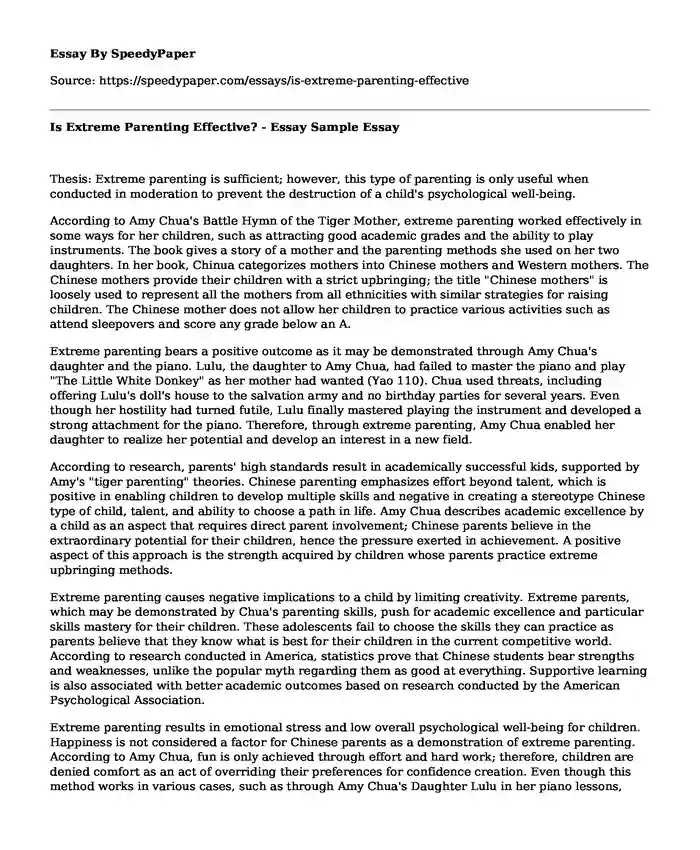Thesis: Extreme parenting is sufficient; however, this type of parenting is only useful when conducted in moderation to prevent the destruction of a child's psychological well-being.
According to Amy Chua's Battle Hymn of the Tiger Mother, extreme parenting worked effectively in some ways for her children, such as attracting good academic grades and the ability to play instruments. The book gives a story of a mother and the parenting methods she used on her two daughters. In her book, Chinua categorizes mothers into Chinese mothers and Western mothers. The Chinese mothers provide their children with a strict upbringing; the title "Chinese mothers" is loosely used to represent all the mothers from all ethnicities with similar strategies for raising children. The Chinese mother does not allow her children to practice various activities such as attend sleepovers and score any grade below an A.
Extreme parenting bears a positive outcome as it may be demonstrated through Amy Chua's daughter and the piano. Lulu, the daughter to Amy Chua, had failed to master the piano and play "The Little White Donkey" as her mother had wanted (Yao 110). Chua used threats, including offering Lulu's doll's house to the salvation army and no birthday parties for several years. Even though her hostility had turned futile, Lulu finally mastered playing the instrument and developed a strong attachment for the piano. Therefore, through extreme parenting, Amy Chua enabled her daughter to realize her potential and develop an interest in a new field.
According to research, parents' high standards result in academically successful kids, supported by Amy's "tiger parenting" theories. Chinese parenting emphasizes effort beyond talent, which is positive in enabling children to develop multiple skills and negative in creating a stereotype Chinese type of child, talent, and ability to choose a path in life. Amy Chua describes academic excellence by a child as an aspect that requires direct parent involvement; Chinese parents believe in the extraordinary potential for their children, hence the pressure exerted in achievement. A positive aspect of this approach is the strength acquired by children whose parents practice extreme upbringing methods.
Extreme parenting causes negative implications to a child by limiting creativity. Extreme parents, which may be demonstrated by Chua's parenting skills, push for academic excellence and particular skills mastery for their children. These adolescents fail to choose the skills they can practice as parents believe that they know what is best for their children in the current competitive world. According to research conducted in America, statistics prove that Chinese students bear strengths and weaknesses, unlike the popular myth regarding them as good at everything. Supportive learning is also associated with better academic outcomes based on research conducted by the American Psychological Association.
Extreme parenting results in emotional stress and low overall psychological well-being for children. Happiness is not considered a factor for Chinese parents as a demonstration of extreme parenting. According to Amy Chua, fun is only achieved through effort and hard work; therefore, children are denied comfort as an act of overriding their preferences for confidence creation. Even though this method works in various cases, such as through Amy Chua's Daughter Lulu in her piano lessons, children develop skills and compliance but fail to acquire the actual audacity for greatness. However, Amy observed that most Western adults having grown up with supportive parents did not have a close relation compared to Chinese children who appreciated and endowed their children despite the harsh childhood.
According to Lulu and Sophia, the daughters of Amy Chua, extreme parenting results in self-sufficient children. Lulu and Sophia acknowledge to an interview with David Cameron that they always had it in mind that their parents were on their side despite the type of abusive acts they would put them through. Lulu and Sophia are described as thoughtful and polite, unlike most research predict that extreme parenting causes isolation and unfriendliness to children; however, a conclusion cannot be made based on this small sample size of two (Zhang 400). Therefore, considering their academic excellence and perceptions of the world Lulu and Sophia obtained from their parent's extreme method of upbringing, extreme parenting may be linked to self-sufficiency.
Conclusively, extreme parenting has demonstrated both negative and positive impacts on the children's psychological well- being; however, Lulu and Sophia, being victims of "tiger parenting," demonstrate more positive outcomes to the style. Extreme parenting results in the achievement of undiscovered potential and high academic excellence. However, the same method of parenting compresses creativity in children. To obtain the maximum benefit of extreme parenting, parents should practice moderation of extreme and supportive parenting to their children.
Works Cited
Yao, Souchou. "Tiger Parenting." The Shop on High Street. Palgrave Macmillan, Singapore, 2020. 101-118.
Zhang, Wei. "Shadow education in the service of tiger parenting: Strategies used by middleclass families in China." European Journal of Education 55.3 (2020): 388-404.
Cite this page
Is Extreme Parenting Effective? - Essay Sample. (2023, Dec 30). Retrieved from https://speedypaper.com/essays/is-extreme-parenting-effective
Request Removal
If you are the original author of this essay and no longer wish to have it published on the SpeedyPaper website, please click below to request its removal:
- Essay Sample on Childhood Obesity in the United States
- Essay Example: Adoption versus Abortion
- The Ignored Problem of Street Children, Free Research Paper Sample
- Free Essay Sample on Childhood-Onset Fluency Disorder (Stuttering)
- Experiences that Affected my Personality. Free Essay
- Free Essay Example. Marriage and Parenting in Adulthood
- Parental Rights to the Children - Essay Sample
Popular categories





